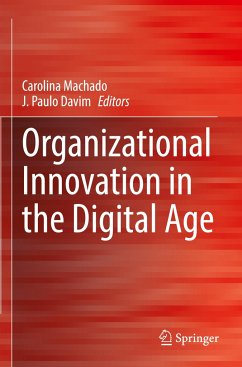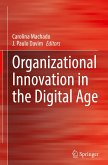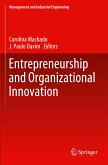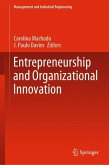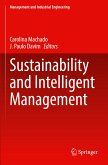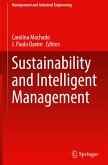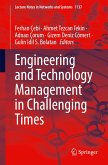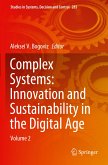Organizational Innovation in the Digital Age
Herausgegeben:Machado, Carolina; Davim, J. Paulo
Organizational Innovation in the Digital Age
Herausgegeben:Machado, Carolina; Davim, J. Paulo
- Broschiertes Buch
- Merkliste
- Auf die Merkliste
- Bewerten Bewerten
- Teilen
- Produkt teilen
- Produkterinnerung
- Produkterinnerung
This book focuses on how businesses manage organizational innovation processes. It explores the innovative policies and practices that organizations need to develop to allow them to be successful in this digital age. These policies will be based on key resources such as research and development and human resources and need to enable companies to respond to challenges they may face due to the digital economy. It explains how organizational innovation can be used to improve business's development, performance, conduct and outcomes.
Contributing to stimulate the growth and development of each…mehr
Andere Kunden interessierten sich auch für
![Organizational Innovation in the Digital Age Organizational Innovation in the Digital Age]() Organizational Innovation in the Digital Age125,99 €
Organizational Innovation in the Digital Age125,99 €![Entrepreneurship and Organizational Innovation Entrepreneurship and Organizational Innovation]() Entrepreneurship and Organizational Innovation117,99 €
Entrepreneurship and Organizational Innovation117,99 €![Entrepreneurship and Organizational Innovation Entrepreneurship and Organizational Innovation]() Entrepreneurship and Organizational Innovation117,99 €
Entrepreneurship and Organizational Innovation117,99 €![Sustainability and Intelligent Management Sustainability and Intelligent Management]() Sustainability and Intelligent Management147,99 €
Sustainability and Intelligent Management147,99 €![Sustainability and Intelligent Management Sustainability and Intelligent Management]() Sustainability and Intelligent Management213,99 €
Sustainability and Intelligent Management213,99 €![Engineering and Technology Management in Challenging Times Engineering and Technology Management in Challenging Times]() Engineering and Technology Management in Challenging Times117,99 €
Engineering and Technology Management in Challenging Times117,99 €![Complex Systems: Innovation and Sustainability in the Digital Age Complex Systems: Innovation and Sustainability in the Digital Age]() Complex Systems: Innovation and Sustainability in the Digital Age132,99 €
Complex Systems: Innovation and Sustainability in the Digital Age132,99 €-
-
-
This book focuses on how businesses manage organizational innovation processes. It explores the innovative policies and practices that organizations need to develop to allow them to be successful in this digital age. These policies will be based on key resources such as research and development and human resources and need to enable companies to respond to challenges they may face due to the digital economy. It explains how organizational innovation can be used to improve business's development, performance, conduct and outcomes.
Contributing to stimulate the growth and development of each individual in a dynamic, competitive and global economy, the present book can be used by a diverse range of readers, including academics, researchers, managers and engineers interested in matters related with Organizational Innovation in the Digital Age.
Contributing to stimulate the growth and development of each individual in a dynamic, competitive and global economy, the present book can be used by a diverse range of readers, including academics, researchers, managers and engineers interested in matters related with Organizational Innovation in the Digital Age.
Produktdetails
- Produktdetails
- Verlag: Springer / Springer International Publishing / Springer, Berlin
- Artikelnr. des Verlages: 978-3-030-98185-3
- 1st ed. 2022
- Seitenzahl: 232
- Erscheinungstermin: 20. April 2023
- Englisch
- Abmessung: 235mm x 155mm x 13mm
- Gewicht: 359g
- ISBN-13: 9783030981853
- ISBN-10: 3030981851
- Artikelnr.: 67653102
- Herstellerkennzeichnung Die Herstellerinformationen sind derzeit nicht verfügbar.
- Verlag: Springer / Springer International Publishing / Springer, Berlin
- Artikelnr. des Verlages: 978-3-030-98185-3
- 1st ed. 2022
- Seitenzahl: 232
- Erscheinungstermin: 20. April 2023
- Englisch
- Abmessung: 235mm x 155mm x 13mm
- Gewicht: 359g
- ISBN-13: 9783030981853
- ISBN-10: 3030981851
- Artikelnr.: 67653102
- Herstellerkennzeichnung Die Herstellerinformationen sind derzeit nicht verfügbar.
Carolina Machado received her Ph.D. degree in Management Sciences (Organizational and Politics Management area/Human Resources Management) from the University of Minho in 1999, Master degree in Management (Strategic Human Resource Management) from Technical University of Lisbon in 1994, and Degree in Business Administration from University of Minho in 1989. Teaching in the Human Resources Management subjects since 1989 at University of Minho, she is since 2004 Associated Professor, with experience and research interest areas in the field of Human Resource Management, International Human Resource Management, Human Resource Management in SMEs, Training and Development, Emotional Intelligence, Management Change, Knowledge Management, and Management/HRM in the Digital Age/Business Analytics. She is Head of the Human Resources Management Work Group at the School of Economics and Management at University of Minho, Coordinator of Advanced Training Courses at the Interdisciplinary Centre ofSocial Sciences, Member of the Interdisciplinary Centre of Social Sciences (CICS.NOVA.UMinho), University of Minho, as well as Chief Editor of the International Journal of Applied Management Sciences and Engineering (IJAMSE), Guest Editor of journals, books Editor and book Series Editor, as well as Reviewer in different international prestigious journals. In addition, she has also published both as Editor/Co-Editor and as Author/Co-Author several books, book chapters, and articles in journals and conferences. J. Paulo Davim is Full Professor at the University of Aveiro, Portugal. He is also distinguished as Honorary Professor in several universities/colleges/institutes in China, India and Spain. He received his Ph.D. degree in Mechanical Engineering in 1997, M.Sc. degree in Mechanical Engineering (materials and manufacturing processes) in 1991, Mechanical Engineering degree (5 years) in 1986, from the University of Porto (FEUP), the Aggregate title (Full Habilitation) from the University of Coimbra in 2005, and the D.Sc. (Higher Doctorate) from London Metropolitan University in 2013. He is Senior Chartered Engineer by the Portuguese Institution of Engineers with an MBA and Specialist titles in Engineering and Industrial Management as well as in Metrology. He is also Eur Ing by FEANI-Brussels and Fellow (FIET) of IET-London. He has more than 35 years of teaching and research experience in Manufacturing, Materials, Mechanical and Industrial Engineering, with special emphasis in Machining & Tribology. He has also interest in Management, Engineering Education, and Higher Education for Sustainability. He has guided large numbers of postdoc, Ph.D., and master's students as well as has coordinated and participated in several financed research projects. He has received several scientific awards and honours. He has worked as Evaluator of projects for ERC-European Research Council and other international research agencies as well as Examiner of Ph.D. thesis formany universities in different countries. He is Editor in Chief of several international journals, Guest Editor of journals, books Editor, book Series Editor, and Scientific Advisory for many international journals and conferences. Presently, he is Editorial Board Member of 30 international journals and acts as Reviewer for more than 100 prestigious Web of Science journals. In addition, he has also published as Editor (and Co-Editor) more than 200 books and as Author (and Co-Author) more than 15 books, 100 book chapters, and 500 articles in journals and conferences (more than 300 articles in journals indexed in Web of Science core collection/h-index 61+/12500+ citations, SCOPUS/h-index 66+/15500+ citations, Google Scholar/h-index 85+/25500+ citations). He has been listed in World¿s Top 2% Scientists by Stanford University study.
Chapter 1. Digital Technologies, Marketing Agility, and Marketing Management Support Systems: How to Remain Competitive in Changing Markets.- Chapter 2. Neuromarketing for Design Thinking: The use of Neuroscientific Tools in the Innovation Process.- Chapter 3. Surfing on Big Data: Automation and Data Mining as a Marketing Strategy.- Chapter 4. Video Recruitment: Online Perspectives and Implications for Employer Branding.- Chapter 5. The future of work: Personal and engaging practices for a superior productivity.- Chapter 6. Data-Driven Innovation: Digital Tools, Artificial Intelligence and Big Data.- Chapter 7. Social Media and Innovation: Opportunities and Challenges for Organizations.- Chapter 8. E-Recruitment and the impact of digital age on recruitment: a critical literature review.
Chapter 1. Digital Technologies, Marketing Agility, and Marketing Management Support Systems: How to Remain Competitive in Changing Markets.- Chapter 2. Neuromarketing for Design Thinking: The use of Neuroscientific Tools in the Innovation Process.- Chapter 3. Surfing on Big Data: Automation and Data Mining as a Marketing Strategy.- Chapter 4. Video Recruitment: Online Perspectives and Implications for Employer Branding.- Chapter 5. The future of work: Personal and engaging practices for a superior productivity.- Chapter 6. Data-Driven Innovation: Digital Tools, Artificial Intelligence and Big Data.- Chapter 7. Social Media and Innovation: Opportunities and Challenges for Organizations.- Chapter 8. E-Recruitment and the impact of digital age on recruitment: a critical literature review.

